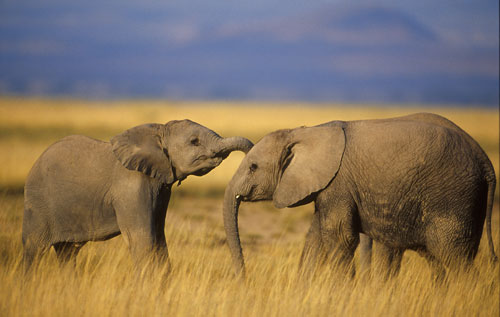In the modern world, it is disheartening to see how humans, once known for their capacity for love and compassion, are increasingly behaving like animals, or perhaps even worse. The very qualities that define our humanity—kindness, empathy, and care—seem to be diminishing in the face of growing self-centeredness and indifference. Ironically, in some instances, animals appear to exhibit a deeper sense of empathy and love than we do.
A Lesson from Nature: The Elephants of Wayanad
A poignant story from Wayanad during a recent natural disaster illustrates this beautifully. An elderly woman, caught in the calamity, sought refuge in the forest with a group of children. Surrounded by a herd of elephants, she cried out for mercy, asking for protection for herself and the children. In a moment that can only be described as miraculous, the elephants responded with compassion. Even a young elephant, moved by her pleas, shed tears. The entire herd then took it upon themselves to safeguard the woman and the children for nearly two days.

This remarkable incident raises a crucial question: If animals, often perceived as lacking in complex emotions, can demonstrate such profound empathy, what excuse do we, as humans, have for our growing indifference?
The Disconnection Between Body and Soul
One reason for this decline in compassion may lie in our misunderstanding of the relationship between body and soul. We often forget that our bodies are merely vessels, temporary homes for our eternal souls. Across different lifetimes, our souls inhabit different bodies, each time bringing us new experiences and opportunities for growth. However, in our current lives, many of us become so preoccupied with our physical existence that we lose sight of our true nature.
We are, at our core, tiny particles of the divine light, each of us born to experience the world, to find joy, and to ultimately reunite with the divine. Yet, in our quest for material success and personal gain, we become disconnected from our spiritual essence, losing our ability to feel compassion for others.
Compassion as the Path to Spiritual Enlightenment
A central question arises: Should we pursue a state of detachment or embrace compassion in our spiritual journey? While detachment has often been hailed as a path to enlightenment, it is compassion that holds the true key to spiritual growth.
Detachment, in its true sense, does not mean becoming cold or indifferent. Rather, it refers to fulfilling our responsibilities without becoming overly attached to the outcomes. However, compassion goes beyond this. It is a state where the soul melts, where we open ourselves up to the suffering of others, and in doing so, elevate our spiritual state.
It is only through compassion that we can truly connect with the divine. Compassion allows us to transcend the limitations of our physical existence and align ourselves with the higher spiritual realms. It is a practice that can only be cultivated while we are alive, and it is through this practice that we can eventually merge with the divine light.
The Imperative of Compassion in Our Times
In these times, when the natural world is being destroyed, when trees are disappearing, and when the future looks bleak, it is more important than ever to practice compassion. Our world is in desperate need of healing, and that healing can only come from a collective awakening to the power of love and empathy.
As we journey through life, let us remember that we are not just bodies but souls on a divine mission. We are here to experience the world, to grow, and ultimately, to return to the divine light. But this journey is not one of isolation—it is one of connection. Through compassion, we can elevate not only ourselves but the entire world, helping to restore the balance that has been lost.
In the end, it is not detachment that will lead us to enlightenment, but the deep, soul-stirring compassion that we show to all living beings. This is the true path to spiritual awakening, the path that will lead us back to the divine.

